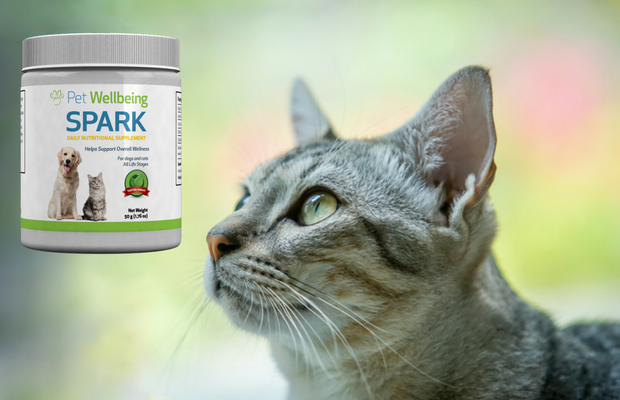
Pet Immunology 101: Why pH Balance is vital for Pet's Wellbeing
In our eBook on Pet Allergies, we go into depth on "Pet Immunology 101" because it is such an essential part of your pets' wellbeing.
This blog shares important information on keeping your pet's immune system healthy and strong by maintaining a pH balance.
Let’s take a closer look at how allergies occur and review basic immunology. This will help explain why it can be so challenging to find the underlying cause of allergies, such as food allergies, which can be especially tricky to pin them down! Ultimately, the key to your pet's healthy immune system is homeostasis, and this is why:
The immune system maintains homeostasis by preventing pathogens from disrupting the body's normal functioning. It achieves this in various ways, including adaptive immunity when the body encounters a new pathogen, innate immunity, secreting acids onto the skin and using mucus membranes to breakdown bacteria.
There are several ways the immune system protects the body, including the skin, antigens and mucus membranes. The immune system promotes a skin pH that deters some bacteria. When antigens encounter a foreign substance, they remember it and later produce antibodies when it enters the bloodstream again.
Homeostasis is the mechanism by which the body maintains normalcy, including pH; therefore, most of the time, pH is normal at 7.0.
Acid-Base balance: normal body tissues are very close to neutral pH (7.0). Slight variations in pH can make the body slightly acidic (less than 7.0) or slightly alkaline/basic (greater than 7.0). These variations can alter nerve function. Any deviation in pH can irritate nerves leading to an itchy sensation.
The acid-base status of tissues changes in an allergic response. Histamine release causes an initial acidic environment that returns to normal after the histamine is removed from circulation.
For your pet - one important thing to know is 60-70% of the immune system lines the intestinal tract – called the GALT – Gut Associated Lymphoid Tissue – lymph nodes lining the intestinal tract. The rest of the humoral immune system lies throughout our body – the blood, lymph nodes under the arm, front leg, under the jaw, inguinal region, and behind the knee, to name a few. This is the same for all mammals.
Therefore, to keep your pet's immune system strong there two things to keep in mind as a takeaway for any pet owner, since the majority of your pet's immunity is connected to their gut health:
- Keeping alkaline balance in your pet's gut (intestinal tract) through their diet
- Providing the nourishment and antioxidants to strengthen your pet's immunity
If you would like to know more in depth information about immunology, you need to understand "Immunoglobulins" - follow the description below or download out eBook to learn more about how to keep your pet's immune system strong in the long run and how this is all related to allergies!
Anyone who has ever served in the military and prepared to deploy overseas on short notice has received a gamma-globulin shot (those darned things hurts for days). The gamma-globulin shot is loaded with immunoglobulins – these are the proteins in the blood that affect different parts of the humoral (as opposed to cell-mediated) immune system. The humoral immune system is largely involved in mediating the allergic response.
When I think of humoral immunity, I think of contracting chickenpox as a child. The antibodies that help the body fight chickenpox provide protection the next time the body encounters chicken pox. This is why most humans only become infected with chickenpox once. This part of the immune system has a lot to do with lymph nodes (it’s why our lymph nodes get big when we have a cold).
When I think of cell-mediated immunity, or protection, I think of a wound and all the white blood cells that come to clean up the mess. Sometimes there is so much to clean up, pus accumulates. Pus is made up of white blood cells.
The lymphoid tissue secretes immunoglobulins (a large part of that gamma-globulin shot we talked about). Mammalian immunoglobulins come in five classes: IgA, IgD, IgE, IgG and IgM. Diagnostic testing determines which immunoglobulin class is overactive, thus what type of allergy is occurring, and then helps determine how to treat the patient.
Cells of the Immune System: most cells involved in allergic reactions are a subset of the white blood cells. Each cell type has a different function:
-
Lymphocytes are predominantly found in the lymphatic system, thus their name. There are three major types of lymphocytes:
- NK cells - Natural Killer cells - detect tumors and cells infected with a virus. Once detected, NK cells destroy the infected cell.
- T cells - produced in the thymus - involved in cell-mediated immunity.
- B cells - produced in the bone marrow - involved in humoral immunity.
- Mast cells - these are large cells that contain packets of histamine. When stimulated, due to attachment of IgE on the cell surface, mast cells release histamine into the tissues. Mast cells are most abundant in the skin, lungs and intestinal tract - where allergic exposure is also most common.
- Eosinophils - are elevated most commonly in allergic or parasitic conditions, although there are other, less common causes of elevated eosinophils in the blood. When stimulated, eosinophils release several different compounds. These compounds, in turn, stimulate mast cells and basophils to participate in the local immune response.
- Basophils - are the least common cell type, and contain histamine and heparin, like mast cells. Basophils respond to ectoparasites and allergic conditions. Basophil concentrations will be quite high at tick bite locations, involved in the allergic response at these sites.
Learn more in our FREE eBook on Pet Allergies & Pet Immunology:
For caring owners who want the best for their pet, without the debilitating side effects and expensive fees of prescribed medicines, discover how Spark is the one natural supplement that can help restore your pet's immune system and wellbeing naturally:
SPARK - Daily Nutritional Supplement 50g
One serving per day provides support for:
- Healthy bones, teeth and coat
- Immune system and normal recovery
- Good digestion and nutrient absorption
- Joint and muscle health
- Healthy hormone levels
- Fighting free radical damage (anti-oxidant)
- Important vitamins & minerals for growth, aging and normal cell repair
- 1 canister lasts ~ 40 days for a cat
- 1 canister lasts ~ 14 days for a dog
Order SPARK today and give your dog or cat a lifetime of excellent health.
90 day money-back guarantee!
Legal disclaimer: Results may vary from pet to pet






